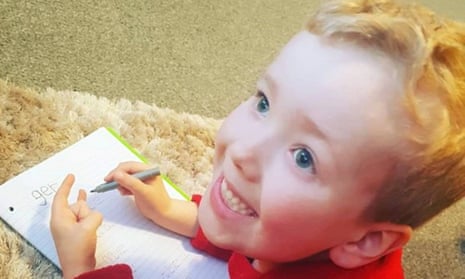An investigation to locate so-called “ghost children” who have fallen off the radar during the pandemic is to be launched by England’s children’s commissioner, the Observer can reveal, amid growing concerns over their welfare.
In an intervention further highlighting the concerns over the whereabouts of tens of thousands of children, Rachel de Souza said she would immediately begin an exhaustive inquiry to find missing students in 10 areas to assess why they have disappeared from official view.
She said it was part of a “call to arms” to tackle persistent absences since the pandemic began. She warned that the horrendous case of Arthur Labinjo-Hughes, the six-year-old who was tortured to death by his stepmother and father in June last year, had injected further urgency into solving the problem.
Some estimates have suggested that as many as 100,000 children are at risk of abuse after failing to return to school following the schools lockdown last year. Persistent absence increased to 16.3% in secondary schools in autumn 2020, compared with 15% in 2019, not including non-attendance because of Covid issues.
De Souza told the Observer she feared a lack of provision for children with special educational needs was pushing them out of school, with pupils facing bullying and mental health problems. “We’re hearing lots of things about ‘ghost children’,” she said. “I hate that term. These are real flesh-and-blood children. We should be able to find out where every child in England is. We should be making sure they are in school or high-quality education.
“Arthur’s case was heartbreaking. We have to wait for the serious case review, but you can’t help asking yourself: if we hadn’t been locked down, or had we been able to ensure he was in school, would we have been able to stop this? This weekend, I really reflected. We must do everything we can for safeguarding purposes to make sure children are in school, particularly the most vulnerable. There is no reason in 2021 why we shouldn’t be able to find out where every child is, and make sure they are in school, getting a decent education.”
The 10 local authority areas to be investigated are currently being identified. De Souza said she would use her statutory powers to carry out the probe if necessary, but that all initial conversations suggested councils and other local institutions would cooperate.

It comes after Ofsted’s chief inspector, Amanda Spielman, warned that ministers have “no handle” on who the missing children are or where they are. She said school absences had led to significant fall in the numbers of referrals to social care, potentially putting more children at risk of abuse. Spielman has called for an official register of children who are not attending school.
De Souza said her office had received a huge amount of testimony from children not at school and their parents, which suggests that lack of mental health provision remains one cause behind absences. One 15-year-old boy said he had been on a mental health waiting list for three years.
A 16-year-old boy said it had taken a year to have medication prescribed to help his mental health condition, meaning he missed a year of school and crucial exams. “If I was two years older I would have had some of the help I needed straight away, and may have not got into such a downward spiral,” he said.
There is also evidence that a lack of provision for special educational needs is combining with mental health issues to fuel the problem. “My ADHD and the lack of support I have received over the years has made my mental health decline seriously,” said a 17-year-old boy not in school. “I am at risk and am worrying my family a lot.” Some children talked about the impact of bullying. One 13-year-old said he was “homeschooled due to being bullied at my secondary school”.
Nadhim Zahawi, the education secretary, said his department had now set up a new “attendance alliance” designed to bring together the key figures able to tackle the problem of missing school children.
“They will be working over the coming months to make sure everyone working on the ground with children, as a teacher, football coach, mental health worker or in any other role, has the tools and resources they need to break down barriers to children attending school,” he said. “I welcome the children’s commissioner’s support with this work and will continue to prioritise taking action to make sure children have the opportunity to spend time in class with inspirational teachers and good friends – simply because it is the single most powerful tool at our disposal to make sure every child fulfils their potential.”
